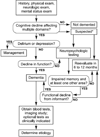Impact of gene patents and licensing practices on access to genetic testing for Alzheimer disease
- PMID: 20393312
- PMCID: PMC2913132
- DOI: 10.1097/GIM.0b013e3181d5a68e
Impact of gene patents and licensing practices on access to genetic testing for Alzheimer disease
Abstract
Genetic testing for Alzheimer disease includes genotyping for apolipoprotein E, for late-onset Alzheimer disease, and three rare autosomal dominant, early-onset forms of Alzheimer disease associated with different genes (APP, PSEN1, and PSEN2). According to researchers, patents have not impeded research in the field, nor were patents an important consideration in the quest for the genetic risk factors. Athena Diagnostics holds exclusive licenses from Duke University for three "method" patents covering apolipoprotein E genetic testing. Athena offers tests for apolipoprotein E and genes associated with early-onset, autosomal-dominant Alzheimer disease. One of those presenilin genes is patented and exclusively licensed to Athena; the other presenilin gene was patented but the patent was allowed to lapse; and one (amyloid precursor protein) is patented as a research tool. Direct-to-consumer testing is available for some Alzheimer disease-related genes, apparently without a license. Athena Diagnostics consolidated its position in the market for Alzheimer disease genetic testing by collecting exclusive rights to patents arising from university research. Duke University also used its licenses to Athena to enforce adherence to clinical guidelines, including elimination of the service from Smart Genetics, which was offering direct-to-consumer risk assessment based on apolipoprotein E genotyping.
Conflict of interest statement
Similar articles
-
APP, PSEN1, and PSEN2 mutations in early-onset Alzheimer disease: A genetic screening study of familial and sporadic cases.PLoS Med. 2017 Mar 28;14(3):e1002270. doi: 10.1371/journal.pmed.1002270. eCollection 2017 Mar. PLoS Med. 2017. PMID: 28350801 Free PMC article.
-
Genetics of Alzheimer disease.J Geriatr Psychiatry Neurol. 2010 Dec;23(4):213-27. doi: 10.1177/0891988710383571. J Geriatr Psychiatry Neurol. 2010. PMID: 21045163 Free PMC article. Review.
-
Impact of gene patents and licensing practices on access to genetic testing for hearing loss.Genet Med. 2010 Apr;12(4 Suppl):S171-93. doi: 10.1097/GIM.0b013e3181d7b053. Genet Med. 2010. PMID: 20393307 Free PMC article.
-
Frequency of mutations in the presenilin and amyloid precursor protein genes in early-onset Alzheimer disease in Spain.Arch Neurol. 2002 Nov;59(11):1759-63. doi: 10.1001/archneur.59.11.1759. Arch Neurol. 2002. PMID: 12433263
-
Genetics of Alzheimer's disease.Arch Med Res. 2012 Nov;43(8):622-31. doi: 10.1016/j.arcmed.2012.10.017. Epub 2012 Nov 8. Arch Med Res. 2012. PMID: 23142261 Review.
Cited by
-
Cystic Fibrosis Patents: A Case Study of Successful Licensing.LES Nouv. 2013 Mar 1:21-30. LES Nouv. 2013. PMID: 24231943 Free PMC article.
-
Patents in genomics and human genetics.Annu Rev Genomics Hum Genet. 2010;11:383-425. doi: 10.1146/annurev-genom-082509-141811. Annu Rev Genomics Hum Genet. 2010. PMID: 20590431 Free PMC article. Review.
-
DNA patents and diagnostics: not a pretty picture.Nat Biotechnol. 2010 Aug;28(8):784-91. doi: 10.1038/nbt0810-784. Nat Biotechnol. 2010. PMID: 20697400 Free PMC article. No abstract available.
References
-
- Alzheimer's Association. Alzheimer's disease facts and figures 2007: a statistical abstract of U.S. data on Alzheimer's disease. [Accessed July 16, 2007]. http://alz.org/national/documents/Report_2007FactsAndFigures.pdf.
-
- Hayden EC. Alzheimer's tests under fire. Nature. 2008 October 30;455(7217):1155. - PubMed
-
- Post SG, Whitehouse PJ, Binstock RH, et al. The clinical introduction of genetic testing for Alzheimer disease: an ethical perspective. JAMA. 1997 March 12;277(10):832–836. - PubMed
-
- Small GW, Rabins PV, Barry PP, et al. Diagnosis and treatment of Alzheimer disease and related disorders. Consensus statement of the American Association for Geriatric Psychiatry, the Alzheimer's Association, and the American Geriatrics Society. JAMA. 1997;278(16):1363–1371. - PubMed
Publication types
MeSH terms
Substances
Grants and funding
LinkOut - more resources
Full Text Sources
Other Literature Sources
Medical


